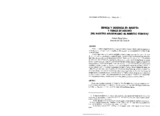Ciencia y docencia en Agustín y Tomás de Aquino (del maestro agustiniano al maestro tomista
Autor
Pérez-Estévez, Antonio
Editor
UCOPressFecha
1997Materia
Filosofía medievalTomás de Aquino
San Agustín
METS:
Mostrar el registro METSPREMIS:
Mostrar el registro PREMISMetadatos
Mostrar el registro completo del ítemResumen
Se hace un análisis comparativo de los conceptos de ciencia, maestro y discípulo tal como aparecen en el De Magistro de san Agustín y en la cuestión 11, «De Magistro», de la disputacion De Veritate de santo Tomas de Aquino. La ciencia agustiniana de las verdades inteligibles y eternas se adquiere por una visión mental del entendimiento y la razón y supone Ia buena voluntad del sujeto; Ia tomista consiste más bien en el conjunto de formas inteligibles adquiridas a partir de un proceso deductivo, lógico-necesario, que se inicia con los primeros principios y axiomas evidentes. Para Agustín, hay solo un maestro de las verdades inteligibles que se encuentra en el interior de cada alma racional y que se manifiesta solo al hombre interior o aquel en el que domina la buena voluntad. Para Tomas de Aquino, existen dos maestros: uno principal e interior, que es Dios, y otro secundario y externo, pero también maestro, el cual ayuda al discípulo a adquirir Ia habilidad y el hábito de deducir verdades a partir de los primeros principios y axiomas evidentes y con el número de formas inteligibles. Para Agustín, todos somas discípulos del único maestro de Ia Verdad que es Cristo y seremos buenos o malos discípulos de acuerdo con la buena o mala voluntad que lo domine. Para Tomas de Aquino, el discípulo posee a medias las nociones o verdades que va a aprender, es decir, en sus primeros principios o axiomas evidentes y adquirirá con Ia ayuda importante del maestro a adquirir Ia habilidad y el hábito de deducir y desplegar las nociones y verdades encerradas en los primeros principios y axiomas evidentes Science and teaching in Augustine and Thomas Aquinas. The author tries to make a comparative analisis of the notions science, teacher and disciple such as they appear in St. Augustine's De Magistro and in question 11th, «De Magistro», of the Disputatio De Veritate of Saint Thomas Aquinas. Augustinian science of intelligible and eternal truths is adquired by a mental view of .intellet and reason; it supposes the good will of knowing subject. Thomist science consists of a number. of inteligible forms adquired from a deductive logic-necessary process that begins with the first. obvius pnnciples and axioms. For Augustin, there is only one teacher of intelligible truths that hides himself in the deepest. of every rational soul and shows the Truth only to the interior man, that is, the one dommated by the good will. For Thomas Aquinas, there exist two different teachers: the main and interior one that is God, and anothe~ external and human, with perfect and actual knowledge, who helps the disciple to get the ability and the habit of deducing notions and truths from the first obvious principles and axioms. For Augustin, we all are disciples of the umque teacher of Truth, Christ, and we will be good or bad disciples according to our good or evil will. For Thomas Aquinas, every disciple has from the very beginning all the notions and truths that he is going to learn, but in potency or in their seminal reasons -the first obvious principles and axioms-; but he will try, with the important help of the teacher, to get the ability and the habit of deducing and developpmg all notionsand truths enclosed within the first evident principles and axioms.

